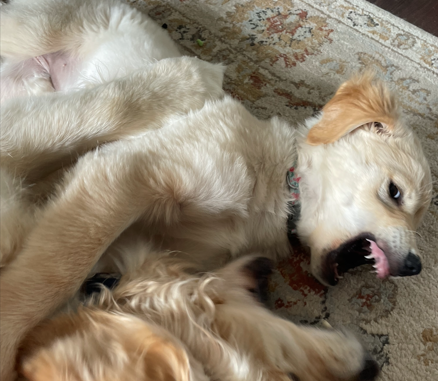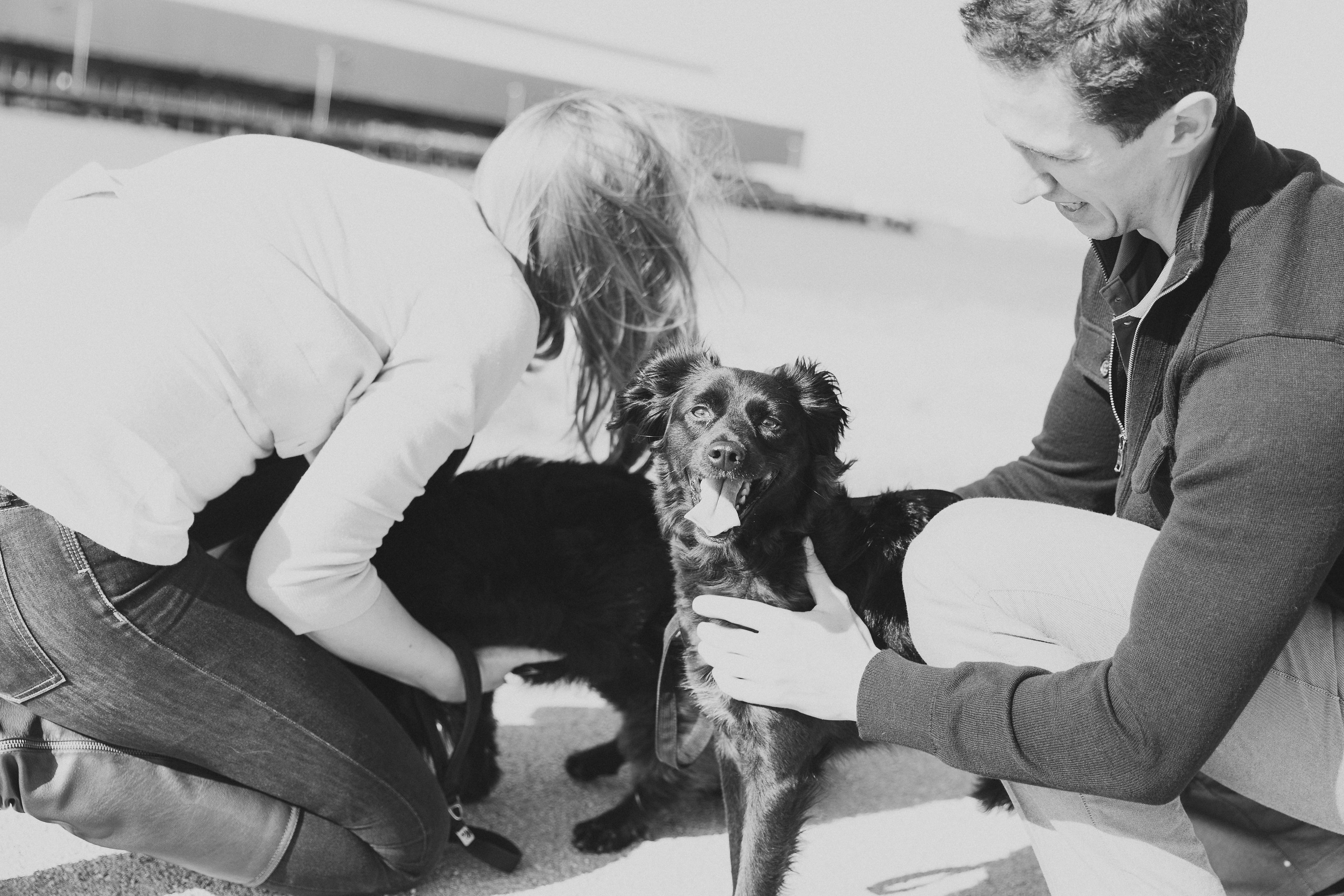I came to know it as the Puppy Witching Hour.
I could all but hear Prince’s “Let’s Go Crazy” playing as the nightly soundtrack nightly during the first 6 months my Golden Retriever puppy was with me. My normally adorable, cuddly, playful ball of golden cuteness turned into an outright lunatic for an hour, every night, without fail.
Here are the lessons I learned during this crazy time during my pup’s development:
If your normally sweet puppy turns into a wild gremlin every evening – zooming through the house, biting everything in sight, and ignoring all your commands – you’re not alone. What you’re experiencing is known as the puppy witching hour, and it’s a totally normal (if exhausting) part of puppy development. Read on to learn why it happens, how long it lasts, and most importantly, how to help your pup (and yourself) get through it with less stress.
What is the Puppy Witching Hour?
I did extensive research to learn about what I called “The Puppy Witching Hour.” I learned people had other names for it. Names like:
- “Six O’clock Stupid”
- “Happy Hour” (two bites for the price of one)
- “Zoomies on Zoomies”
The “witching hour” is a phrase used by dog owners to describe the burst of chaotic energy many puppies experience, usually in the late afternoon or evening. It can look like nonstop running, jumping, nipping, barking, or an inability to settle. While it might feel like your puppy is possessed, this behavior is actually a sign of:
-
Overstimulation from a long day
-
Overtiredness, like a toddler on the edge of a meltdown
-
Unspent energy, especially in high-drive breeds
-
A lack of routine around calming down or winding down for the night
Think of it as your puppy’s way of saying,
“I’m done but I don’t know how to stop.”
Running haphazardly, jumping on furniture, biting any surface that gets in its way, and uncontrollable energy… ‘How’s the puppy?’ everyone would ask me. I’d respond honestly, ‘22 hours a day I have the cutest puppy ever. Two hours a day I have a demon from the depths of Hades.‘
I felt like a terrible dog owner. My vet reassured me this was normal, even as she eyed the fresh bite wounds on my hands from the previous night’s Witching Hour. She taught me that there are a few things you can do to have a better-behaved puppy. (tldr: you need to be a better puppy-owner)
Training Your Puppy Starts With Training Yourself
Want a better-behaved puppy? It starts with becoming a more consistent, calmer owner. You can’t stop the puppy witching hour entirely, but you can shape how your pup responds — and how you handle it matters just as much.
When your puppy starts to lose it, chasing them or yelling might feel instinctive. But to your dog, that’s just part of the game:
“Oh great! She’s joining the fun!”
Instead, focus on consistency, structure, and calm energy.
Routine Is Everything
Puppies thrive on predictability. When they know what to expect — and when — they’re far less likely to spin out during the witching hour.
Stick to a simple daily rhythm:
-
Potty
-
Eat
-
Play
-
Sleep
Repeat.
The more consistent you are with timing and transitions, the easier it will be for your dog to regulate their energy and behavior.
And yes, physical exercise is important — walks, fetch, tug-of-war — but it won’t eliminate the witching hour entirely. That’s where mental stimulation comes in.
Work Their Brains, Not Just Their Bodies
Physical energy isn’t the only thing driving your pup’s chaos. Puppies need mental exercise to wear out their busy brains.
Try:
-
Food puzzles (like a tray with covered treat slots)
-
Sniff-and-search games (hide treats around the house)
-
Basic training (even 10–15 minutes of “sit,” “leave it,” and “touch” goes a long way)
Mental challenges tire your puppy out in a healthy, focused way — and they’re less likely to unleash mayhem if they’ve had a thinking workout.
Don’t Let Cute Confuse the Rules
If it’s not okay at 7 p.m., it shouldn’t be okay at 8 a.m. Puppies explore the world with their mouths, but it’s up to us to teach them what is appropriate to bite.
Set this boundary early:
-
No hands, fingers, toes, or feet during play.
-
Use toys, not body parts, to redirect their biting instinct.
-
Respond with a firm, exaggerated “OUCH!” when they cross the line — this mimics how littermates teach boundaries.
Consistency is key. If you let biting be cute sometimes but scold them later, it sends mixed signals your pup can’t decode.
“22 hours a day I have the cutest puppy ever. Two hours a day I have a demon from the depths of Hades.”
Get Ahead of the Witching Hour
You know it’s coming — so plan for it.
Just like toddlers before bedtime, puppies benefit from a calming, predictable routine. Instead of reacting to the chaos, start an acceptable activity before the energy boils over.
Try these preemptive strategies:
-
Rotate engaging toys to keep their attention fresh
-
Offer a treat-stuffed Kong or a frozen puzzle feeder
-
Freeze a washcloth soaked in chicken broth for a soothing chew
-
Create a “quiet zone” like a playpen or crate with calming items
If you have kids in the house, remind them: no chasing or wild play during this time. Excitement feeds excitement, and it only makes things worse.
Set Boundaries (And Stick to Them)
When things spiral, your puppy needs structure — not scolding, but accountability.
In my case, a dramatic “Owwww!” followed by me turning away worked… until one night she sunk her puppy teeth deep into my toe. I yelped, clutching my foot while she came around for another attack.
Time for a time-out.
She went into the closet. Not as a punishment, but as a sensory reset. A trainer once told me never use the crate for time-outs since it should stay a positive, safe place. Instead, use a neutral space — no toys, no stimulation, just time to settle. Almost like magic, she’d come out calmer. And minutes later, the storm would pass. Just like that — puppy witching hour over.
Own Your Part in the Chaos
Sometimes, I wasn’t just parenting the demon — I was the gatekeeper to the underworld.
I’d try to squeeze in a walk before heading to a workout, but it wasn’t fair to her. Eventually, I adjusted my routine — creating a garage workout space so we could both move and release energy.
That said, too much exercise can be just as bad. Aim for 3 sessions a day, 15–30 minutes each, and adjust based on your pup’s energy and behavior.
And if you’re walking in the door after a long workday, remember: your puppy’s been waiting. They don’t want just a potty break — they want you. Carve out at least 15–30 minutes of real playtime, even when you’re tired.
“You wanted the companionship and love that a dog gives in exchange for very little… It really isn’t asking too much for you to spend some dedicated one-on-one time with her.”
— AKC Trainer Hilarie Erb
I researched the puppy witching hour obsessively. I even had a book on raising Golden Retrievers — Chapter 5, “The Rebel,” covered the five-month mark. One day, I got out of the shower to find my five-month-old eating Chapter 5. Fully living up to the title.
Sometimes your little demon really gets irony.
You’ll Both Make It Through The Puppy Witching Hour
The puppy witching hour can feel like an unpredictable storm — but like all phases, it will pass. With structure, patience, and a little humor, you’ll help your pup learn to settle, and you’ll both come out stronger for it. One day soon, you’ll be sipping your tea while your now-grown dog snoozes beside you, and you’ll remember those wild puppy evenings with a mix of exhaustion and fondness. For now, breathe deep, stay consistent, and know you’re not alone in the madness.

If you enjoyed this post, you should read 4 Ways to Change A Pet's Life For The Better here.
